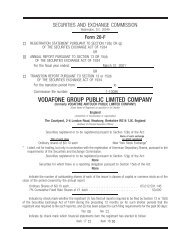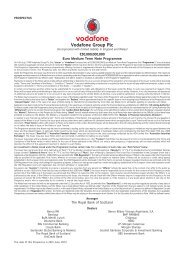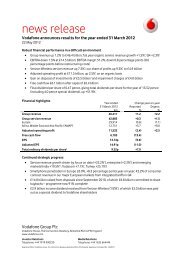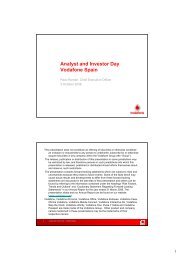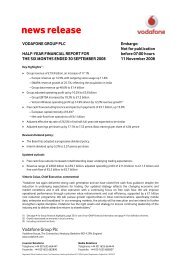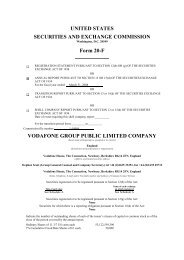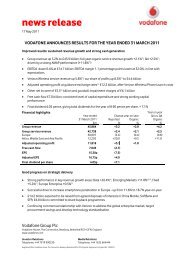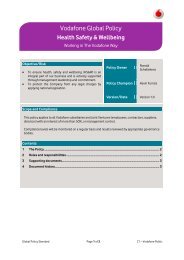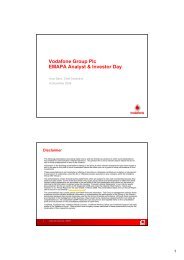pdf (305Kb) - Vodafone
pdf (305Kb) - Vodafone
pdf (305Kb) - Vodafone
You also want an ePaper? Increase the reach of your titles
YUMPU automatically turns print PDFs into web optimized ePapers that Google loves.
MOBILE TELECOMMUNICATIONS RESULTS<br />
Turnover<br />
Turnover in the mobile telecommunications businesses increased by 4%, or 6% on an organic basis at constant<br />
exchange rates. The increase in turnover was driven principally by organic service revenue growth, at constant<br />
exchange rates, of 5%, which improved principally as a result of growth of 8% in the Group’s average controlled<br />
customer base compared to the prior period.<br />
Voice revenue improved by 4% on an organic basis at constant exchange rates, following an increase in total<br />
voice usage in controlled mobile businesses of 9% to 83.7 billion minutes for the six months ended 30 September<br />
2004, offset by competitive pressures resulting in tariff reductions and lower termination rates reducing incoming<br />
revenue.<br />
Non-voice revenue increased to £2,389 million for the six months ended 30 September 2004, or 12% on an<br />
organic basis at constant exchange rates. Messaging revenue continued to represent the largest component of<br />
non-voice revenue. Data revenue as a percentage of non-voice revenue increased to 26.7% compared to 25.6%<br />
for the prior period as the Group continued to drive adoption of new consumer services, such as <strong>Vodafone</strong> live!,<br />
and business offerings, including <strong>Vodafone</strong> Mobile Connect datacard and BlackBerry from <strong>Vodafone</strong>.<br />
Other revenue increased to £1,817 million, or 12% on an organic basis at constant exchange rates. The increase<br />
has arisen from higher levels of gross additions and upgrades in the period and revenue from non-<strong>Vodafone</strong><br />
customers acquired as a result of the acquisition of UK service providers in the prior year. Other revenue related<br />
to acquisition and retention activities increased to £1,534 million, or 10% on an organic basis at constant<br />
exchange rates.<br />
Group operating profit before goodwill amortisation and exceptional items<br />
Acquisition and retention costs, net of attributable revenue, increased by 18% to £1,866 million. The increase was<br />
primarily driven by higher customer growth in the UK and Spain and increased investment in retention activities in<br />
the UK and Japan. Other operating expenses as a percentage of service revenue reduced from 16.6% to 16.1%<br />
as the Group continued to realise cost efficiencies, particularly in network and IT costs.<br />
Depreciation and licence amortisation charges increased by 16% following the commencement of 3G services in<br />
a number of the Group’s controlled mobile businesses. Licence amortisation amounted to £204 million in the<br />
period compared to £22 million in the prior period.<br />
The Group’s share of operating profit, before goodwill amortisation and exceptional items, in associated<br />
undertakings grew strongly, primarily due to growth at Verizon Wireless in the US.<br />
Total Group operating profit, before goodwill amortisation and exceptional items, for the mobile businesses<br />
decreased by less than 1% to £5,670 million, with organic growth of 4%, as unfavourable exchange rate<br />
movements, particularly the strengthening of Sterling against the Euro and the US Dollar, reduced this growth by<br />
5%. The acquisition of service providers in the UK in the prior year increased growth by 1%.<br />
PROPORTIONATE RESULTS<br />
Group proportionate turnover increased by 8% to £21,179 million as a result of both organic growth and the effect<br />
of increased stakes in a number of the Group’s existing businesses, partially offset by the disposal of Japan<br />
Telecom. In the mobile businesses, proportionate turnover grew by 11% to £20,711 million, representing organic<br />
growth of 10%.<br />
The Group’s proportionate EBITDA margin, before exceptional items, for the mobile businesses decreased from<br />
40.5% for the six months ended 30 September 2003 to 39.7% in the current period. The main reasons for this<br />
decrease were the strengthening of Sterling, which has had a greater impact on the Group’s higher margin<br />
operations, the buy-out of the minority interests in <strong>Vodafone</strong> Japan in the current period and the increase in<br />
acquisition and retention costs referred to above.<br />
7




